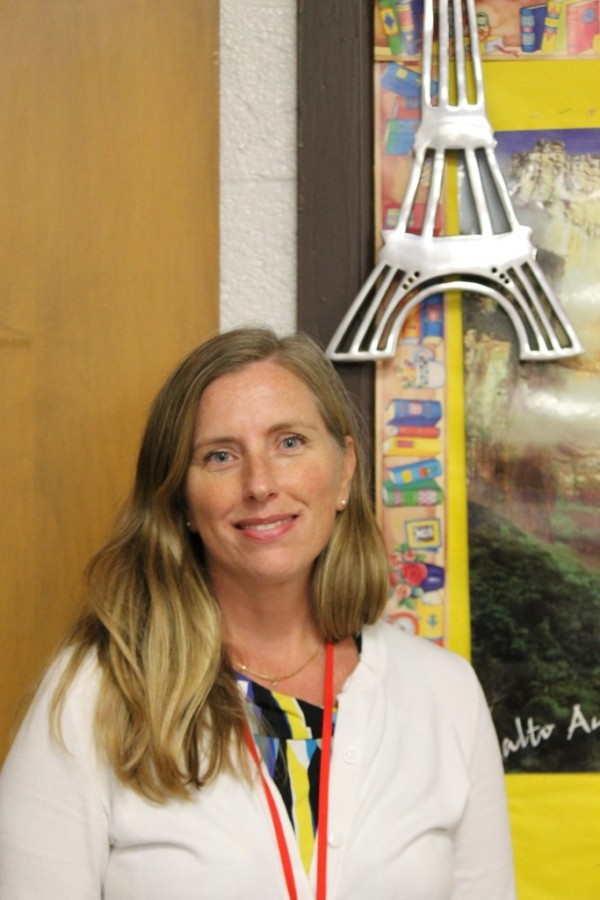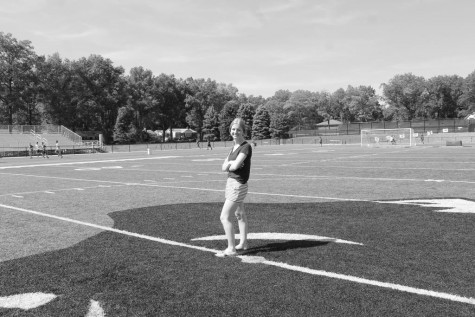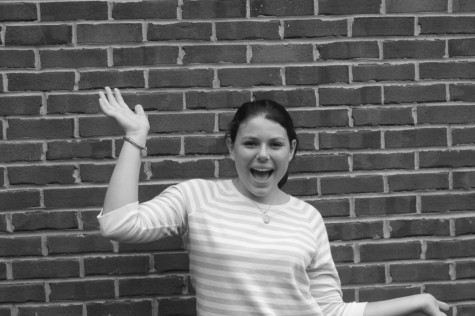Galvanizing the French curriculum
Photo Credit: Maddy Doubet
Dr. Galvagni has filled the open teaching position left by the retirement of former teacher Al Dattolo. Having learned French through her time in West Africa as a member of the Peace Corp, Dr. Galvagni brings a new angle to French studies in Glen Rock.
October 1, 2014
Ever since Dr. Galvagni was a little girl, teaching came to her mind when she thought about a career.
“I have three brothers, and I remember I used to play school with them,” she said. “I used to make them sit down and do worksheets.”
Today she is living that childhood dream as one of the newest members of the GRHS faculty. She teaches French, Theory of Knowledge and is the adviser of the French Club.
“I wonder, generationally speaking, how many choices were represented to us in my generation on what kind of careers would be available to me as a female. So I don’t know if it was just kind of assumed that teaching would be the type of career that I might go into,” she said.
“I don’t think I was ever encouraged to necessarily be a scientist or a doctor or a lawyer or any of those things. I fell into it, but gladly. It’s my calling; it’s what I do.”
Unlike other teachers in the World Language Department, Dr. Galvagni did not grow up speaking a foreign language. At the time, there was not a big push to teach second languages in elementary schools, so her first exposure to French was in seventh grade.
“I do find it can be an advantage to me as a teacher because I know what it is like to be the student trying to learn to the language from the beginning,” she said.
She fell in love with the language and continued to study it through high school and college. She attended the College of Charleston in South Carolina where she received her B.A. From there, she went to West Africa with the Peace Corps where she was fully immersed in a French speaking culture.
In West Africa, Dr. Galvagni learned the three ‘missions’ the Peace Corps has to offer. The first is to provide trained individuals to countries in need. The second is to spread American culture with those countries to share what it is to be American. The third is, when one returns from the Peace Corps as, s/he share the knowledge that was gained while abroad.
“The experience redefined my pursuit of teaching having had that amazing experience in West Africa, so I wanted to come back and teach French through a global eye. Not just teaching French from France,” Dr. Galvagni said. “France is not the only country in the world that speaks French. It is spoken is many countries in Africa and other parts of the world. It was my goal to create a class that would focus on the larger picture.”
After the Peace Corps, Dr. Galvagni received a master’s degree in education at Wake Forest University with a specialization in teaching foreign languages.
“I’ve been a student for a long time, but I’ve been teaching for a long time too because I’ve been learning and teaching simultaneously.”
Then, she got a Master’s Degree in Philosophy at the City University of New York in New York City, and she also continued to pursue her PhD in French with a specialization in African and Caribbean francophone culture, literature and human rights.
Dr. Galvagni has been teaching for at least fifteen years at a variety of levels. She’s taught first grade all the way through university education. She has mostly taught French as a World Language, but she taught English as a foreign language when she was in West Africa with the Peace Corps. At the College of Charleston, she taught an elective course called the Introduction to African Civilization.
“It was a humanities course, and it was an elective. It was looking at African studies. Using my experience in West Africa, I was able to apply that to that course. I also had some experience before all of this for a very short time in Early Childhood,” Dr. Galvagni explained.
At Glen Rock, she is teaching French (World Language Department) and a philosophy course called Theory of Knowledge based out of the English Department.
There is only one position for a French teacher at the school, so the returning students have had only had former teacher, Mr. Dattolo.
“Dr. Galvagni’s class is much more oral-oriented compared to Mr. Dattolo’s,” current French student, Juliana Roddy said. “For example, we practice speaking the language for the entire class period and use the last five minutes for clarification in English. I feel like this helps us really learn the language and will help prepare us to, hopefully, be able to speak fluently in French one day.”
She is the only teacher who teaches courses in two different teaching departments.
“As a new teacher here in Glen Rock, I’m learning the ropes. I’m learning all of the systems and such. There is a system called Atlas Rubicon that teachers use to map their curriculum – what they plan to teach for the year,” she explained. “I’m using that information to help me build my courses. I’m also reaching out to colleagues in both departments to help me structure my courses.”
This is her first year teaching Theory of Knowledge, but philosophy is not a new concept to her. She has a background in Philosophy from her prior education.
“This is content material that I am very familiar with and I have used in my own research, my own writing and in other classes,” Dr. Galvagni said.
“For example, we have talked about various philosophers and great thinkers that come up in Theory of Knowledge in my French curriculum, as well as thinkers and philosophers that have come up across all of the different courses that I’ve taught including African Civilization.”
Dr. Galvagni considers herself a constant learner and she learns things from her students everyday. One of the biggest lessons they taught her is to be flexible in the face of any adversity. She may come in the classroom with a specific lesson plan, but that lesson may not work for the students that day.
“If I could teach one thing to all students, it would be to enjoy their pursuit of education. It has opened so many doors for me as I pursued my own experiences and different degrees and such. There have been very rewarding experiences,” Dr. Galvagni said. “To be opened to new experiences, to learn to think out of the box, to think for themselves, find solutions and to just enjoy this time of being a student and take everything they can from it to make them complete individuals.”






John Galvagni • Oct 2, 2014 at 6:18 pm
Wow!